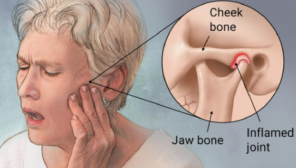TMJ Problems: The Temporomandibular joint (TMJ) or jaw joint is a hinge that connects your jaw to your skull. It makes it possible for you to move your jaw up and down and from side to side, so you can talk, chew, and yawn.
Injury to your jaw bone, the TMJ, or the muscles of your head and neck can lead to TMD (temporomandibular joint disease). Other causes include grinding or clenching your teeth, arthritis, and stress. Even stress sometimes can cause you to tighten your facial and jaw muscles and/or clench your teeth.
TMD often causes severe pain and discomfort. It can be temporary or last many years. It may affect one or both sides of your face. Common symptoms include pain or tenderness in your face, jaw joint area, neck and shoulders, and in or around the ear when you chew, speak, or open your mouth wide. Your jaw may get “stuck” or “lock” in the open- or closed- position and have clicking, popping, or grating sounds. You may also experience pain in a tooth, head, neck, ringing in the ears or dizziness.
A Board Certified Prosthodontist, such as Dr. Huang, can prescribe medications and/or a custom-made splint guard. These plastic mouthpieces fit over your upper or lower teeth so they don’t touch. They lessen the effects of clenching or grinding and correct your bite by putting your teeth in a centered position. He then can replace missing teeth using crowns, bridges, or braces to balance the biting surfaces of your teeth or to correct a bite problem.
Nova Premier Dental
313 Park Ave #306 Falls Church, VA 22046
(703) 532-7586

